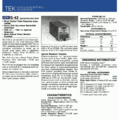S-42: Difference between revisions
No edit summary |
No edit summary |
||
| Line 45: | Line 45: | ||
<gallery> | <gallery> | ||
Tek s-42 a.JPG | |||
Tek s-42 b.JPG | |||
Tek s-42 e.JPG | |||
Tek s-42 d.JPG | |||
Tek s42.jpg | |||
Tek s-42 block diag.png|block diagram | |||
Tek_s-42 schem.png|schematic | |||
s42-spectral-response.jpg | S-42 spectral response | |||
s42-explosion-diagram.jpg | |||
Tek S-42 1989 catalog.png|Description in [[Tek Catalogs|1989 Catalog]] | |||
</gallery> | </gallery> | ||
[[Category:7000 and 3S series sampling heads]] | [[Category:7000 and 3S series sampling heads]] | ||
[[Category:Optoelectronic instruments]] | [[Category:Optoelectronic instruments]] | ||
Revision as of 18:32, 2 April 2018
Template:Plugin Sidebar 2 The Tektronix S-42 is a sampling head for 1300 nm optical signals. It has an FC/PC fiberoptic connector for the input signal. It is essentially an S-4 sampling head with a photodiode at the input.
Specified accuracy is for connections through 8/125 micron single-mode fibre, although a lens in front of the photodiode allows connections using multi-mode fibre as well, at some degradation of response speed.
The manual shows it being used in a 7S12-driven TDR setup with an external OT503 electro-optic converter as the optical signal source.
Key Specifications
| Pulse response | 55 ps |
|---|---|
| Bandwidth | 6.4 GHz (equiv.) |
| Spectral response | 1000 nm – 1700 nm |
| Deflection | 50 μW/Div to 50 mW/Div @ 1300 nm |
| Noise equivalent power | 42 μWRMS max. |
| Max. nondestructive input | 10 mW mean, 125 mW peak |
| Features |
|
Internals
The S-42 borrows heavily from the S-4 sampling head, re-using the S-4 strobe, sampler and preamp boards. It uses the same six-diode traveling-wave sampling gate, strobed by 125 ps pulses generated using a snap-off diode driven by an avalanche transistor.
The S-4's SMA input connector is still present internally, and driven electrically in some of the calibration procedures, with the photodiode removed.
To accommodate the photo diode, the S-42's case is longer than the S-4's. When inserted, the S-42 therefore protrudes from the base unit by about two centimeters.
Pictures
-
-
-
-
-
-
block diagram
-
schematic
-
S-42 spectral response
-
-
Description in 1989 Catalog









